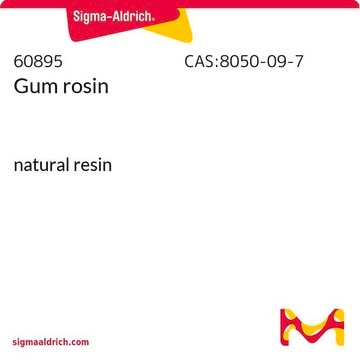Recommended Products
form
beads
Quality Level
color
faint yellow to light beige
mp
80-83 °C (lit.)
solubility
chloroform: 50 mg/mL, clear to hazy, colorless to yellow
Looking for similar products? Visit Product Comparison Guide
Application
Gum mastic, a source of triterpenic compounds and phytosterols, may be used as a source material in diverse biomedical and pharmacological applications.
Quality
May contain some extraneous matter.
Other Notes
To gain a comprehensive understanding of our extensive range of Oligosaccharides for your research, we encourage you to visit our Carbohydrates Category page.
Storage Class Code
11 - Combustible Solids
WGK
WGK 2
Flash Point(F)
Not applicable
Flash Point(C)
Not applicable
Personal Protective Equipment
dust mask type N95 (US), Eyeshields, Gloves
Certificates of Analysis (COA)
Search for Certificates of Analysis (COA) by entering the products Lot/Batch Number. Lot and Batch Numbers can be found on a product’s label following the words ‘Lot’ or ‘Batch’.
Already Own This Product?
Find documentation for the products that you have recently purchased in the Document Library.
Samy A F Morad et al.
Journal of natural products, 74(8), 1731-1736 (2011-08-02)
Mastic, a resinous exudate from Pistacia lentiscus, has been reported to exhibit selective cytotoxicity against different cancer cell lines. There are, however, no data published correlating distinct mastic-derived compounds with the postulated cytotoxic activity. A polypodane-type bicyclic triterpenoid, (8R)-3β,8-dihydroxypolypoda-13E,17E,21-triene (1)
Nikolaos Lemonakis et al.
Planta medica, 77(17), 1916-1923 (2011-08-27)
Chios mastic gum, the resin obtained as an exudate from the trunk and branches of Pistacia lentiscus L var. chia, is used extensively as a constituent of herbal drugs or functional foods. The oral absorption of its major constituents still
Panagiotis Moulos et al.
BMC medical genomics, 2, 68-68 (2009-12-17)
Mastic oil from Pistacia lentiscus variation chia, a blend of bioactive terpenes with recognized medicinal properties, has been recently shown to exert anti-tumor growth activity through inhibition of cancer cell proliferation, survival, angiogenesis and inflammatory response. However, no studies have
Mohammad Sharif Sharifi et al.
Global journal of health science, 4(1), 217-228 (2012-09-18)
The chemical entities of Mastic, Kurdica, Mutica and Cabolica gums from genus Pistacia have been isolated and characterised by GC-Mass Spectrometry, High Performance Liquid Chromatography and Column Chromatography. These chemical entities were screened for anti-microbial activities against nine strains of
S Paraschos et al.
Current medicinal chemistry, 19(14), 2292-2302 (2012-03-15)
The resin of Pistacia lentiscus (L.) var. chia (Duham), an evergreen shrub belonging to the family Anacardiaceae and uniquely cultivated in southern Chios, is known as mastic. It has been used for more than 2500 years in traditional Greek medicine
Our team of scientists has experience in all areas of research including Life Science, Material Science, Chemical Synthesis, Chromatography, Analytical and many others.
Contact Technical Service








